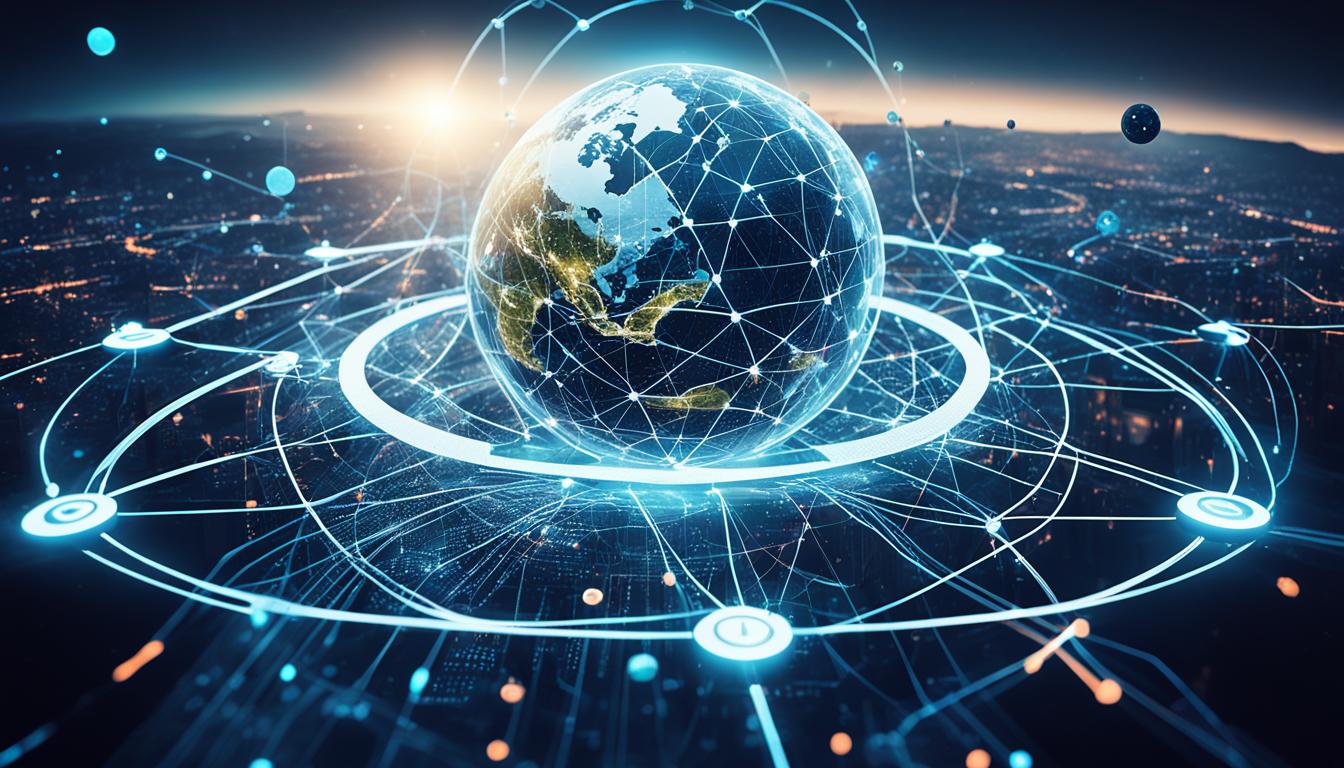Did you know that 94% of online consumers read reviews before making a purchase?
In the digital age, online reputation systems play a crucial role in building trust between buyers and sellers. However, the current systems are vulnerable to manipulation and fraud, leaving consumers skeptical and markets at risk. That’s where decentralized AI reputation systems come in.
Enabled by blockchain technology, decentralized reputation systems offer a solution by verifying user identities and aggregating reputation data. This ensures that the reviews and ratings are trustworthy and reliable, restoring trust in online markets.
But the impact of decentralized reputation systems goes beyond online markets. They can also be applied to content economies, ensuring the credibility of content creators and fostering a transparent digital ecosystem.
Key Takeaways:
- Online reputation systems are widely used by consumers, with 94% of them reading reviews before making a purchase.
- Current reputation systems are susceptible to manipulation and fraud.
- Decentralized AI reputation systems, powered by blockchain technology, verify user identities and aggregate reputation data, restoring trust in online markets.
- These systems can be applied not only to online markets but also to content economies, ensuring credibility and transparency.
- By leveraging decentralized AI reputation systems, consumers can make more informed decisions, and businesses can thrive in a trusted digital landscape.
Advantages of Decentralized AI Reputation Systems
Decentralized AI reputation systems offer numerous advantages over traditional reputation systems. These cutting-edge systems provide unique digital identities for users and verify their identities across multiple platforms, ensuring trust and transparency in the digital age.
One significant advantage is the ability to quantify and tokenize users’ reputation scores based on objective factors such as product quality and customer service. This tokenization process enables reputation data to be easily measured and exchanged, creating a more reliable and efficient system of evaluating individuals and businesses.
Bi-directional reputation system mechanisms, including upvoting and downvoting, allow users to leave feedback on their experiences. This feedback provides valuable insights for both customers and businesses, aiding in decision-making processes and fostering continuous improvement.
Furthermore, decentralized reputation systems have the capability to aggregate reputation data from various platforms. This aggregation allows users to access a comprehensive view of someone’s reputation, enabling informed decisions and promoting a trustworthy online environment.
Decentralized AI reputation systems also incentivize merchants to provide high-quality goods and services. By utilizing AI algorithms, these systems can evaluate the reputation of merchants and reward those who consistently deliver exceptional products and experiences.
| Advantages of Decentralized AI Reputation Systems |
|---|
| Unique digital identities |
| Quantifiable and tokenized reputation scores |
| Bi-directional feedback mechanisms |
| Aggregation of reputation data |
| Incentivization for high-quality goods and services |
The Convergence of AI and Web 3.0 in Decentralized Reputation Systems
AI and Web 3.0 technologies are fueling a transformation in the digital landscape, revolutionizing how we interact and conduct business online. With the rise of decentralized reputation systems, AI is playing a crucial role in enhancing security, accuracy, and trust in these systems.
Decentralized machine learning models and federated learning are emerging as key trends in AI research, shaping the future of reputation systems. These innovative approaches ensure that sensitive user data remains private while allowing AI algorithms to learn from decentralized networks. By bringing together the power of AI and the decentralized nature of Web 3.0, reputation systems can better protect user identities and provide reliable reputation scores.
AI-powered blockchain applications are further driving the advancement of decentralized reputation systems. By leveraging the immutability and transparency of the blockchain, AI algorithms can optimize processes and ensure integrity in reputation data. This convergence allows for a larger scale and more accurate analysis of reputation information, enabling users to make informed decisions and businesses to build trust in online marketplaces.
In an era where trust and transparency are paramount, explainable AI models are becoming essential in AI-generated decision-making processes. By providing clear explanations for their decisions, AI algorithms in decentralized reputation systems promote trust and enable users to understand how reputation scores are determined. This fosters transparency in online interactions and cultivates a trustworthy digital environment.
FAQ
What are decentralized AI reputation systems?
How do decentralized AI reputation systems work?
What is the advantage of using decentralized AI reputation systems?
How are AI and Web 3.0 integrated into decentralized reputation systems?
Source Links
- https://fastercapital.com/content/Decentralized-content-reputation–DCR–Building-Trust-in-the-Digital-Age–Exploring-Decentralized-Content-Reputation.html
- https://www.forbes.com/sites/shermanlee/2018/08/13/a-decentralized-reputation-system-how-blockchain-can-restore-trust-in-online-markets/
- https://www.linkedin.com/pulse/insights-emerging-ai-trends-advancements-web-30-adrianne-phillips-1c

Leave a Reply